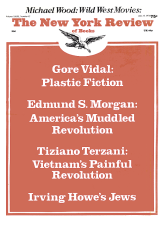In response to:
Eliot's English Usage from the June 10, 1976 issue
To the Editors:
Michael Wood’s reply to my letter in the NYR on June 10 demands a further response. He writes:
I don’t think of Eliot’s Criterion pieces as criticism, and I don’t think of the prefaces as uncollected. They are in books, after all….
Whether “collected” means scattered in many books or gathered into one, many of those with prefaces by Eliot were published in such limited editions that these volumes are unavailable even in most libraries. Since only 500 copies were printed of the translation of Le Serpent containing Eliot’s preface, the basis of a recent attack on his “French connection,” few readers can have referred to the text.
More important, why does Mr. Wood think that Eliot’s reviews in The Athenaeum qualify as criticism, while the remarkably similar ones in The Criterion do not? Certainly the articles that Mr. Wood commends on Kipling, Yeats, and Pound in the former publication hardly differ in approach and method of exposition from those on Housman, D.H. Lawrence, and Freud in the latter. In the Criterion reviews, too, Eliot confronts his contemporaries more directly than perhaps anywhere else, as in the essay on Lawrence (e.g., “He did not understand…that of any two human beings, each has privacies which the other cannot penetrate”), which is much less vague than the analysis of him and of other heretics in After Strange Gods. But isn’t The Criterion itself criticism, even if Eliot’s book reviews are not that but some other category of literary scrutiny?
“Now should I have lain still and been quiet” (Job iii.).
Robert Craft
This Issue
July 15, 1976



